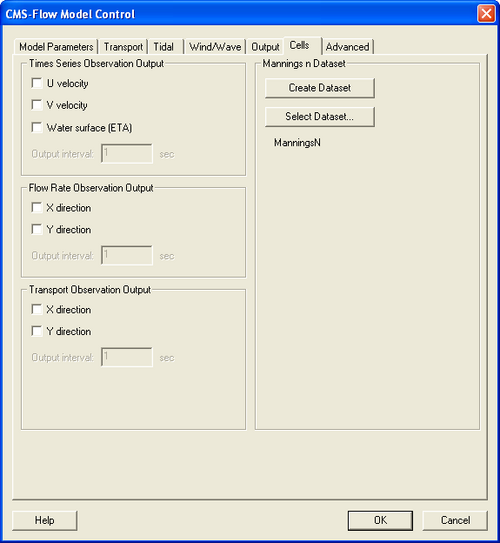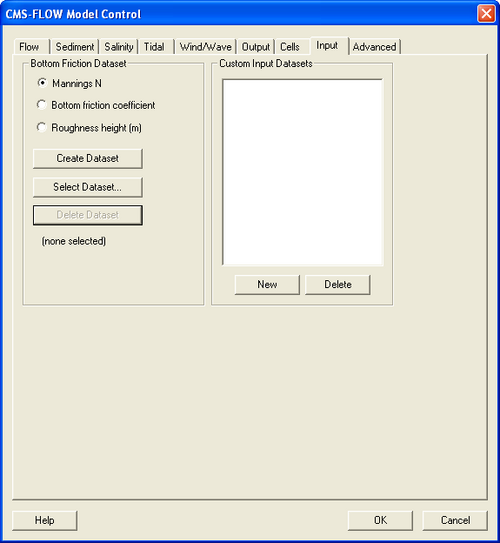CMS-Flow Bottom Friction: Difference between revisions
No edit summary |
No edit summary |
||
| Line 5: | Line 5: | ||
<br style="clear:both" /> | <br style="clear:both" /> | ||
The | [[image:CMS-Flow_Project_Explorer_Bottom_Friction.png|thumb|left|400px|Figure 2.3. FThree SMS Project Explorer showing the Manning's n, Bottom Friction Coefficient and Roughness Height datasets.]] | ||
In SMS 11.0 each time a new CMS-Flow simulation is created a bottom friction (roughness) dataset needs to be created using the ''Create Dataset'' button. | |||
The bottom friction parameter (related to Manning <math>n</math>) is spatially varying (cell-specific) over the grid domain. The default value upon grid creation is 0.025. At times a user may desire to represent locations where added friction is needed due to structures or increased turbulence due to sharp changes in current speed. More information on using this feature of CMS-Flow can be found [[CMS-Flow:Bottom_Friction|'''here''']]. | |||
<br style="clear:both" /> | <br style="clear:both" /> | ||
<br style="clear:both" /> | <br style="clear:both" /> | ||
Revision as of 18:12, 17 January 2011
In SMS versions 10.1 and earlier, the bottom roughness is specified using the Manning's n coefficient in the Cells tab of the CMS-Flow Model Control window (see Figure 2.1). In SMS 11.0, the option is provided to use a roughness height, or bottom friction coefficient. The bottom roughness is specified in the Bottom Friction Dataset section of within the Input tab of the CMS-Flow Model Control window (see Figure 2.2). The Bottom Friction Dataset is specified at every computational (ocean) cell and is required for each model simulation.
In SMS 11.0 each time a new CMS-Flow simulation is created a bottom friction (roughness) dataset needs to be created using the Create Dataset button. The bottom friction parameter (related to Manning ) is spatially varying (cell-specific) over the grid domain. The default value upon grid creation is 0.025. At times a user may desire to represent locations where added friction is needed due to structures or increased turbulence due to sharp changes in current speed. More information on using this feature of CMS-Flow can be found here.
Table 1. SMS Cards related to the bottom friction
| Card | Arguments | Default | Range | Description | Versions |
|---|---|---|---|---|---|
| USE_WALL_FRICTION | CHARACTER | ON | ON | OFF | Turns on or off wall friction | >=3.5 |
| MANNING_N_DATASET | CHARACTER CHARACTER | [<grid file>] [<grid name>//"Datasets/ManningsN"] | none | Grid file name and dataset path for the input Manning's n dataset | >=v3.5 |
| BOTTOM_FRICTION_COEF_DATASET | CHARACTER CHARACTER | [<grid file>] [<grid name>//"Datasets/BottomFricCoef"] | none | Grid file name and dataset path for the input bottom friction coefficient dataset | >=v4.0 |
| ROUGHNESS_HEIGHT_DATASET | CHARACTER CHARACTER | [<grid file>] [<grid name>//"Datasets/RoughnessHeight"] | none | Grid file name and dataset path for the input roughness height dataset | >=v4.0 |
Table 2. Advanced Cards related to the bottom friction
| Card | Arguments | Default | Range | Description | Versions |
|---|---|---|---|---|---|
| MANNING_N_CONSTANT | real number | none | 0.001-0.5 | Specifies input Manning n dataset | >=v3.5 |
| WAVE-CURRENT_MEAN_STRESS | character | W09 | W09 | DATA2 | DATA13 | F85 | HT95 | Defines the model used for calculating the mean bottom shear stress used in hydro | >=4.0 |



